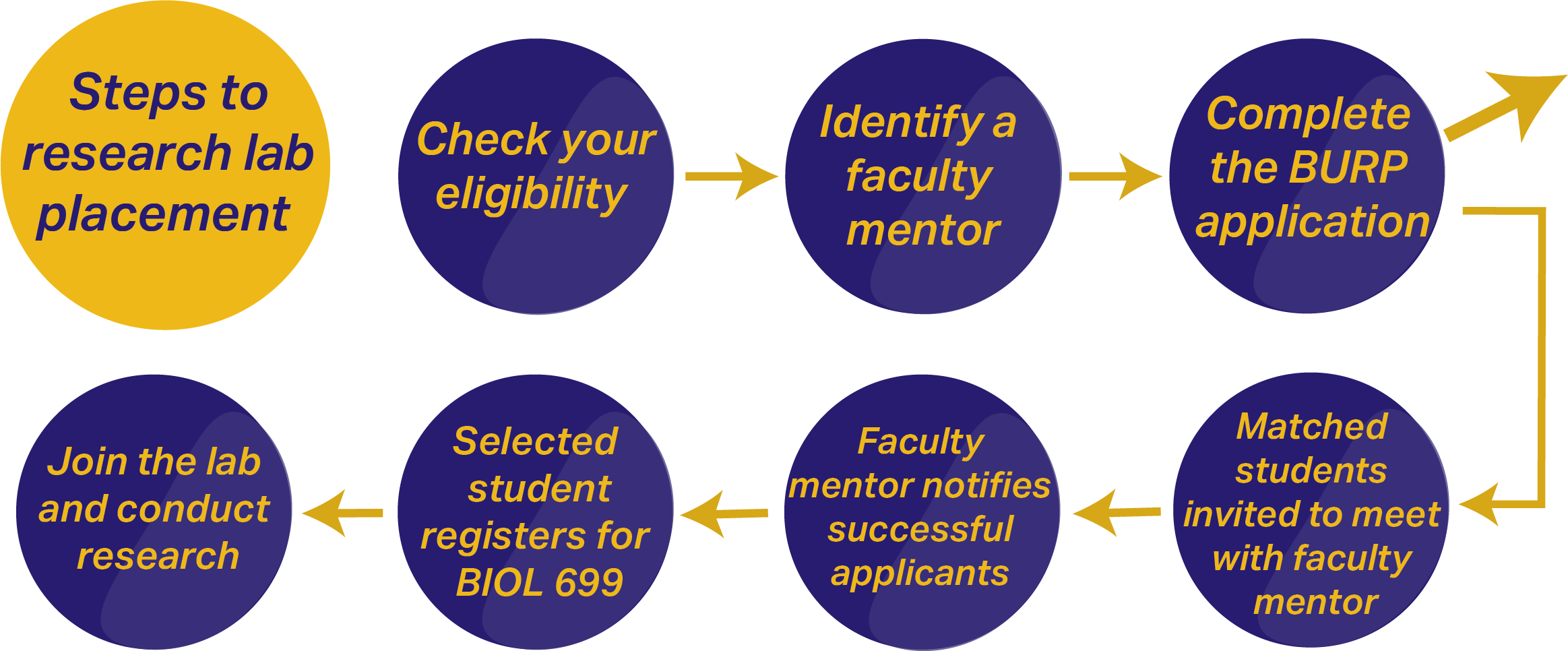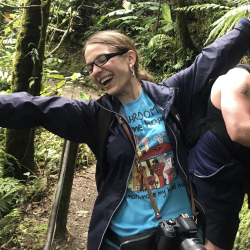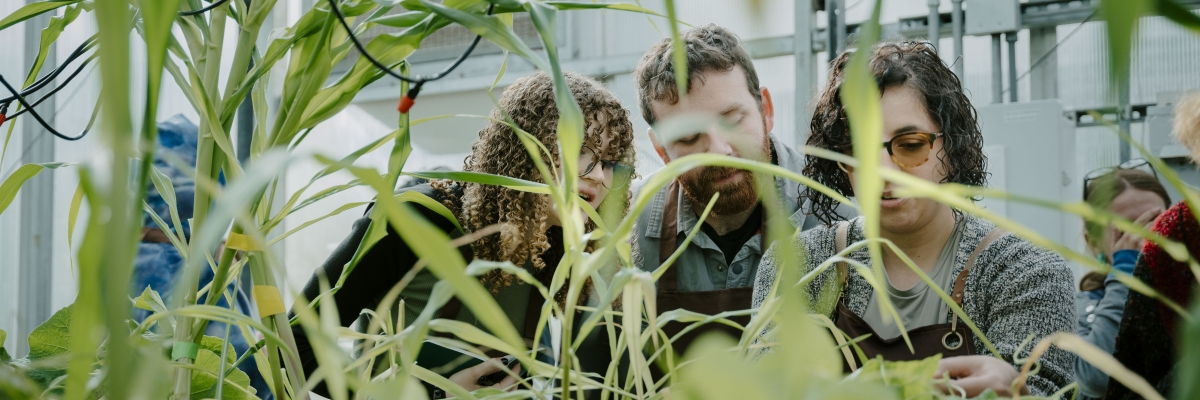Get involved in research through our Biology Undergraduate Research Program (BURP).
What is it? BURP allows students to connect with a Bio Faculty research lab and (if accepted) and gain research experience (students can sign up for units through Independent Research Biol 699)
Before you apply, find the research that interests you. Go to Faculty Research.
Ready to apply? Click here to go to the application.
** Now is a great time to apply for limited space in Fall Semester 2025! Faculty fill their positions in the first weeks of the semester** If you don't get in, you can reapply for Spring 2026 semester.
Learning through discovery
The study of Biology is more than just acquiring knowledge; it's also about creating it through research and experimentation. The Biology Undergraduate Research Program (BURP) at SF State allows our undergraduates to play an active part in that process of generating new knowledge.
By working directly alongside our faculty members in their research labs, students engage with the cutting edge of Biology knowledge to make their own, original discoveries. Research experiences help students grow their transferable skills, deepen their engagement with a specialized field, add real-world context to what they learn in class, and forge connections that support their career growth beyond graduation.
The Department of Biology at SF State is uniquely placed to offer high value research experiences for undergraduates
In many other universities, research is done by PhD students, professional research technicians, and highly-trained post-doctoral fellows. Undergraduate places in research labs are scarce, and undergrads are not the ones leading projects, making discoveries and working closely with Professors.
Here at SF State Bio, genuine engagement of undergraduates in research is a main focus. Our faculty are dedicated to training undergraduates to be independent researchers, and to creating a culture of inclusion and supported learning in our research labs. We publish papers with our undergraduates, we support your participation at conferences and we're committed to helping you advance your education and your career.
Whatever your background, and whatever your career goal, being part of BURP will make you stand out!
Any Biology major or minor is eligible to apply for BURP. You should be in good academic standing, and ideally be able to commit to two semesters of research in the same lab. Acceptance is competitive! Applicants who can describe why they are excited about research and what interests them about a specific lab are most likely to be selected.
Benefits of Research Experience:
- Use 3 units of BIOL 699 as an elective to contribute to your degree
- One-on-one mentorship from a faculty member
- Get workplace-ready by learning in-demand skills and techniques
- Build relationships with faculty who can provide recommendations for graduate school or employers
- Contribute to scientific discovery
Expectations for BURP
Each semester, students are expected to commit to between 6 and 20 hours of work per week in a research lab, where they take part in ongoing experiments and projects under the mentorship and guidance of a Department of Biology faculty member. Some faculty members expect a two-semester comittment, so applying before your final semester is best.
Once accepted into the program and a research lab, BURP students must take the required safety trainings, and register for 1-3 units of BIOL 699 (Independent Study in Biology) each semester. BIOL 699 can be used as an upper-division elective class in every one of our concentrations.
At the end of each research semester, students are graded on an outcome that was agreed upon between the mentor and the student at the start of the semester, as well as their participation, attendance and contribution to ongoing research. The agreed deliverable could be a presentation at a meeting or research showcase, an abstract, a contribution to a research article, a figure or illustration, or something else. Each mentor will set their own expectation in consultation with their BURP students.
We expect that all students taking BIOL 699 will engage in an original research project that will result in a tangible product of some kind. We also recognize that research progress can be slow, and that products can be incremental. Students that have been working in the same lab across multiple semesters will naturally have different expectations than students who are experiencing research for the first time.

More information about BURP
What is "Research Experience"? I've taken lab classes, is this any different?
Every student of Biology knows that textbooks are full of information. But at one point, everything that's now in the textbook was a new discovery, made in a research laboratory.
In contrast to laboratory classes, in research labs, no-one knows what the answer to a question is going to be! You will be working as part of a diverse team (a professor, graduate students, perhaps research staff, and other undergraduates) to address a question that no scientist has answered before. It's slow, it can be frustrating at times, but ultimately being part of a new discovery is a great achievement!
Incremental, careful work in academic research labs produces the great majority of what we know about the world around us, and those novel discoveries eventually find their way to being established facts that we all learn in classes. But brand new discoveries are happening every day, as researchers - at SF State and around the world - work to advance understanding of life on Earth.
Every lab in our department relies on graduate (MS) and undergraduate researchers to help propel their research. BURP allows undergraduates to take part in research by working for course credit (BIOL 699), in the lab of one of our faculty members.
When should I apply to be part of BURP, and how can I maximize my chances of being accepted?
Each semester, faculty members select undergraduates to participate in their research labs. Although open spaces can come up any time, typically faculty fill undergraduate research spaces toward the end of the semester prior to the space being open.
Each faculty member has their own expectations for students receiving BIOL 699 credit, in terms of skills, availability, career goals and interests, so one-on-one conversations are an essential part of the selection process.
The first step is to complete the application on this page (click the button "Apply for BURP!", above), where you can select a faculty mentor and answer some general questions about your goals for participating in BURP.
Who is eligible to apply?
To be a part of BURP you must be an SFSU Biology major or Biology minor, and be in good academic standing (GPA >2.0) at the time of application. BURP is not available for graduate students, post-baccs or students from other departments. Freshmen, Sophomore, Junior and Senior Biology majors or minors are all eligible to apply.
Students who are already working in research labs do NOT need to reapply using the form each semester, but should discuss their plans for the next semester with their PI.
How do I select a lab?
Go to the page "Faculty by Research Discipline", then click on each faculty member's profile and look at their lab website. Note that the application survey asks you to explain specifically why you chose a particular lab to apply to, so spend some time researching the different labs.
Choose a lab that interests you; you may apply to multiple labs by completing the survey more than once, but be specific in every application so the faculty mentor can see why you chose their lab. Be aware that not all labs will have spaces available in every semester, and in some labs spaces fill up quickly! Every lab is different in the number of students that can be trained each semester.
In general, having any research lab experience is more important that the specific research topic of that lab, so even if your career goal is medical school (for example), you will get almost the same benefit from working in a lab studying mosses, or sunflowers, or bacteria that live in thermal pools, as you would get studying cancer cells (we have labs doing each of these, and many more!).
Ask your class professors about their research, ask your friends about their research lab experiences, and don't forget that SF State Biology students can also get credit for research with faculty based at the EOS Center, the California Academy of Sciences, and other local institutions.
How will BURP help me be successful?
Being part of a research lab has so many advantages, no matter what your eventual career goal may be. Being part of an active community of researchers is intellectually stimulating, letting you spend your time thinking deeply about a significant biological problem or question. The community aspect of a research lab is great for studying together, working cooperatively on class work, and having ready access to more experienced peers whose guidance can be invaluable to your academic success. And, if you receive 3 units total in course credit for BIOL699, you can substitute BURP experience for an upper-division, class-based elective, making it easier to graduate on time.
Working in a research lab can lead to tangible benefits for your CV - contributing to a publication, a presentation or other product demonstrates that you understand biology in a deeper way, and that you have skills and knowledge to share with others.
If your goal is graduate school, medical school, a government agency, or industry, research lab experience lifts you over and above many other applicants and makes you stand out.
And having a strong letter of reference from a professor who knows you well, and can speak to your skills beyond your classroom performance, also offers substantial benefits as you apply to your next opportunities.
Is there financial support available?
Yes! Research lab experience (BIOL 699) is already a built-in expectation for many of our undergraduate scholarships and awards administered by the SEO Office; these are competitive applications separate from the BURP application process. Students can also be paid by the hour if the lab has research grant funding; this will vary from lab to lab.
But you can participate in BURP with or without funding. And all students in BURP can earn course credit (up to 3 units of BIOL 699) toward their degree.
Hear from current BURP students
How has BURP enhanced your experience at SF State?

Ileana Rodriguez, Senior, Physiology
Which lab are you in, and how many semesters have you been there?
I am a member of the Crook Lab and I have been in the lab for 2 semesters.
What drew you to SF State Bio, and what drew you to the research lab you're working in?
I have always loved biology and I aspire to enter the field of biomedicine which is what drew me to the biology major at SF State. During my time at SFSU I took BIOL 642 which is Neural Systems and I discovered that I absolutely love the field of neuroscience. I continued to take cellular neuroscience and inquired about joining the Crook lab to continue discovering my passion for neuroscience!
Tell us briefly about the project you are working on right now?
I am currently assisting in a research project that uses electrophysiology to explore the nociceptive differences in male and female Euprymna berryi (bobtail squid).
Can you describe how participating in BURP has impacted your education and career plans?
BURP has been highly influential in the educational and career choices that I am making to become a neuroscientist. While I have always loved medicine and work a job in the medical field, I have grown strong passion for researching and I hope to pursue an MD-PhD with my PhD being in neuroscience.
What has been the most exciting or meaningful part of your BURP experience?
Exploring a topic in biology by researching a very unique model organism. The way we understand the nervous system of cephalopods is still developing and so unique from vertebrates. It is very exciting to learn more and to be curious about the nervous systems of cephalopods.
How has being part of BURP increased your feelings of belonging in STEM?
BURP has further consolidated my identity with being a scientist. SF State has wonderful resources and faculty that make biology exciting and inclusive, being a part of research and having the hands-on experience has made me feel more like a scientist and makes me excited for the future space I hold within the scientific community.
What advice would you give to other SF State Bio students considering BURP?
I would advise student looking for undergraduate research to find a topic that you are passionate about and inquire with professors that may be able to support you in their research lab. And be persistent! Never give up on your dreams of getting involved in research that you truly want to be a part of.

Andre Tran, Senior, CMB.
Which lab are you in, and how many semesters have you been there?
I am part of Dr. Ivan Anastassov’s lab at SF State, and I have been working in the lab for 2 semesters.
What drew you to SF State Bio, and what drew you to the research lab you’re working in?
I was drawn to SF State Bio for its amazing and inclusive community, as well as its strong focus on hands-on learning and research opportunities. I was specifically interested in the lab because of its focus on retinal plasticity, which aligns closely with my passion for neuroscience.
Tell us briefly about the project you are working on right now.
Currently, I am working on a project that focuses on examining developmental characteristics of lamination and quantifying bipolar cell mitochondria in the skate retina. Characterization and comparison of mitochondria within bipolar neurons in the monochromatic skate retina are studied to understand the neurobiology of vision and address the question of what key molecular, cellular and network components are indispensable for retinal formation and function in health and disease.
Can you describe how participating in BURP has impacted your education and career plans?
Participating in BURP has provided me with invaluable hands-on experience, from experimental design to data analysis. It has solidified my desire to pursue a career in science and medicine, giving me the confidence and skills needed to succeed in graduate school and beyond.
What has been the most exciting or meaningful part of your BURP experience?
Contributing to cutting-edge research, presenting at conferences, building connections with mentors and peers. It has been incredibly rewarding to see how our work contributes to the larger scientific community.
How has being part of BURP increased your feelings of belonging in STEM?
BURP has been instrumental in fostering a sense of belonging. Collaborating with peers who share my passion for research, and being mentored by supportive faculty, has shown me that I have a place in the STEM community.
What advice would you give to other SF State Bio students considering BURP?
Take the leap and apply! BURP is a fantastic way to gain hands-on experience, make connections, and explore your interests. Don’t hesitate to reach out to faculty members whose research excites you—they are often more than willing to mentor passionate students.

Katrina McCullough, Senior, EECB
Which lab are you in, and how many semesters have you been there?
I am in the MEEP Lab with Jenna Ekwealor, I have been here since Summer 2024, about six months.
What drew you to SF State Bio, and what drew you to the research lab you're working in?
My interest is in mycology and mycoremediation, and SF State has a long history of mycological research and a very impressive fungarium. Also, a professor from my community college recommended continuing my biology degree here. A friend recommended I reach out because the MEEP lab seemed to be closely aligned with my interests.
Tell us briefly about the project you are working on right now?
I am looking at epiphytic lichens found on Coyote Brush on San Bruno Mountain, examining differences in distribution, morphology, and reproduction between species found on the coastal and inland sides of the mountain.
Can you describe how participating in BURP has impacted your education and career plans?
In a very short period I have become confident with the identification and biology of an organism that I’d not given a lot of thought to before. On top of that, I have been able to speak at a conference about my research.
What has been the most exciting or meaningful part of your BURP experience?
The relationships I’ve made with other people in the lab would have to be at the top of the list, but being able to conduct research that fascinates and challenges me is a close second. The lab feels like a little family, and I wouldn’t have been able to get as far in my research without their help.
How has being part of BURP increased your feelings of belonging in STEM?
My confidence has increased so much in a relatively short period of time which has gone a long way towards reducing the feelings of imposter syndrome. Being able to experience the whole process of research from the field to in front of an audience has also solidified my love of ecology and scientific research.
What advice would you give to other SF State Bio students considering BURP?
Undergraduate research gives us the opportunity to use what we’ve learned and apply it. I think most importantly, especially if you’re not drawn to a super specific field like I am (and even if you are), it gives you the opportunity to explore different areas and find what you’re drawn to. It also provides experience that employers or graduate programs are looking for.

